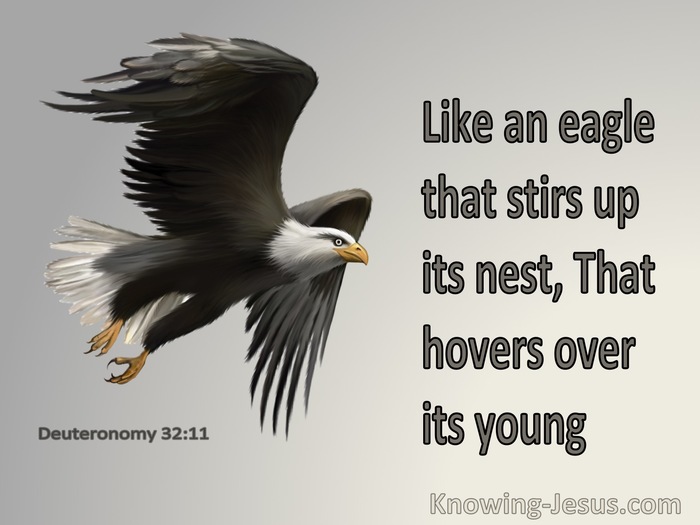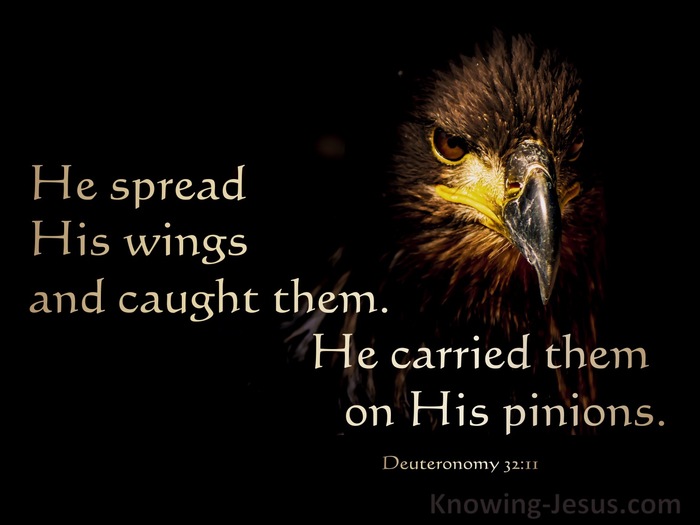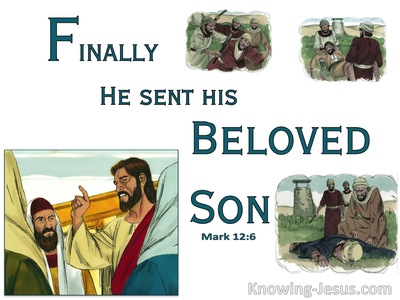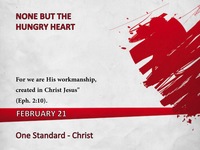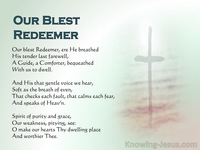◄ What Does Deuteronomy 32:11 Mean? ►
"Like an eagle that stirs up its nest, That hovers over its young, He spread His wings and caught them, He carried them on His pinions.
Deuteronomy 32:11(NASB)
Verse of the Day
Before he died, Moses taught the people of Israel 'The Song of Moses', to help them remember the goodness and faithfulness of God towards His people. It was to encourage them to heed the Word of the Lord and obey His will after he was gone. He recited the words of the covenant that God made with Israel, in the hearing of all the people. 'The Song of Moses' is a long, but beautiful poem, that contrasts the love and loyalty of God to His people, with their wilfulness and waywardness.
It reads like a judicial document, where God is the prosecuting counsel, accusing Israel of apostasy and warning that judgement will fall on the nation if they do not mend their ways. Moses also gives some clear statements on the perfect character of God, Who is good to His people and very gracious, but will most certainly execute justice on those who disobey His Word.
Moses had led the people for nearly forty years and had proved God was faithful to them, while witnessing the petulance of the people, and so he opened his song by calling on heaven and earth to be witness to his words, which were honest and true: "Like droplets on the fresh grass and showers on a herb-garden."
He opened his dialogue proclaiming the greatness of God to be 'The Rock', Whose work is perfect, Whose ways are true, and Who is faithful, righteous, upright, and without prejudice. But he quickly contrasted this with Israel's shortcomings and corrupt ways, calling them: "A perverse and crooked generation," and reminding these foolish and unwise people that God was their Father, Who brought them out of Egypt and established them... promising an inheritance for all the children of Jacob.
In his dramatic composition, this Song of Moses contains a number of beautiful similes and metaphors. In verse 10 we read how the Lord found Israel in a desolate land and provided for them in a barren, howling wilderness. He describes how He surrounded them, cared for them, and protected them, as if they were 'the pupil of His eye', while in verse 11 we read: "Like an eagle that stirs up its nest, and hovers over its young, the Lord spread His wings and caught them, He carried them on His pinions."
What a precious and poignant picture we have of the Lord when likened to an eagle. Eagles have been identified as being swift in flight, and a powerful adversary who is strong and tenacious and with excellent vision. Although the eagle is a fierce bird of prey, it has also been identified as a wise and attentive parent, showing great care and tenderness for its young while teaching them some very hard lessons.
The parent bird may soar up in the thermals and reach incredible heights in search of food. But they are also vigilantly watching over their young with tenderness and care and although they may soar out of sight, their keen eye is watching for anything that may endanger their young in the nest.
An eagle starts to build its eyrie with razor-like thorns and sharp twigs, but lines it with beautiful soft grasses, moss, and feathers on which to lay her eggs. But as the little eaglet grows bigger, the eagle begins to 'stir up its nest', so that the sharp thorns and twigs become uncomfortable for the growing chick. The parent eagles are not masochistic. They want their offspring to leave the comfort of the nest and start to soar into the air... and so they make the eyrie increasingly uncomfortable for their young offspring.
In Exodus, Moses wrote how God bore His people Israel, and carried them on eagles’ wings and brought them to Himself. When an eagle starts to teach her eaglet how to fly, she gathers him up on her feathers and flies higher and higher, carrying the young fledgling on outstretched wings. At the appropriate time, she allows the little eaglet to free-fall from its secure perch, but quickly swoops down, only to catch the baby bird in the safety of her feathers - until he has learned to spread his own wings and soar into the heavens.
The picture of the eagle stirring up its nest, hovering over its young, spreading out its wings and catching its babies on its pinions, paints the most beautiful picture of our heavenly Father as he cares for us, teaches us, trains us, and causes us to grow in grace... as we trust Him in the increasingly problematic times in which we live.
My Prayer
Heavenly Father, thank You for the lovely 'Song of Moses' and the many lessons we can learn from it. Thank You for loving me and saving me through faith in Your only begotten Son. Thank You for the care You so readily give to all Your children and thank You for those times in my life when You have 'stirred up my little nest' and permitted me to undergo difficult times, which have helped to strengthen my faith and to grow in grace and in a knowledge of You. Thank You for being so faithful, even when my faith fails and thank You, Father, for Your day by day provision and care. May I be a living witness to Your never-failing goodness and grace... both in the words I say and the actions I take. This I ask in Jesus' name, AMEN.
Choose a Verse from Deuteronomy 32
Deuteronomy 32:11 Further Study
- Deuteronomy 32:11 in the Parallel Bible
- Deuteronomy 32:11 in the Thematic Bible
- Deuteronomy 32:11 Cross References
- Deuteronomy 32:11 Treasury of Scripture Knowing
- Deuteronomy 32:11 Sermons
- Deuteronomy 32:11 Prayers
- Deuteronomy 32:11 Images
- Deuteronomy 32:11 Devotionals
- Choose Chapter
Never miss a post
